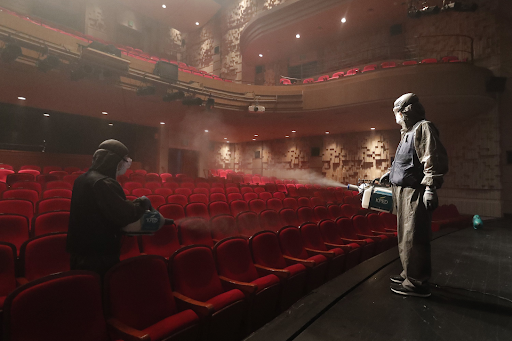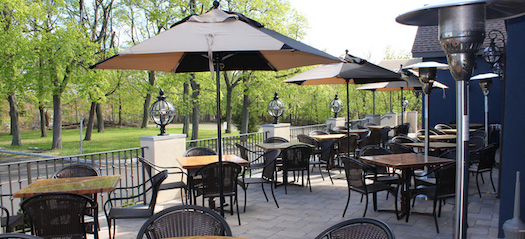
America’s restaurants have become sanitization barons over the past year, taking on the duty to constantly cleanse high-touch surfaces such as tables, menus, chairs, door handles, and of course, restrooms. Small businesses, including those here in Rockland, have been mandated by local and state governments to go to war with latex gloves, bleach, and disinfectant wipes, to decontaminate every square inch of counter or floor as to protect the safety of customers and employees. Unfortunately, that cleanliness comes at a cost. The price of Personal Protective Equipment (PPE) alone has put a financial strain on small businesses, in addition to the mandates for customer capacity and the expense to maintain to-go orders. But is that added expense actually helping anyone? The CDC has reported that the rate of surface transmission for COVID remains extremely low, calling into question some aspects of state sanctioned sanitization. How do Rockland business owners feel about seemingly futile state guidelines and hygiene practices, and what does the future look like for small commerce after the impact of the pandemic?
“Based on available epidemiological data and studies of environmental transmission factors,” the CDC concluded, “surface transmission is not the main route by which SARS-CoV-2 spreads, and the risk is considered to be low.” This credible information has led business owners, health bloggers, journalists, and even medical officials to label the excessive sanitation of surfaces as ‘hygiene theatre.’ This frank term refers to the exercise of taking health measures that are intended to provide an illusion of safety while doing little to reduce any risk. Psychologically, many may feel shielded from disease when they witness an establishment’s effort to reduce pathogens, especially at the height of the COVID pandemic. More will support their local businesses and dine at their favorite restaurants, under the guise of a sterilized environment. Nonetheless, this ineffectual practice may actually be a detriment to companies as they struggle to pay other expenses when they have to cover the cost of PPE equipment, largely on their own.
In fact, not only is ‘hygiene theatre’ a financial obstacle for businesses, but may also be a health hazard. “Concurrently, there are reported increases in poisonings and injuries from unsafe use of cleaners and disinfectants since the start of the COVID-19 pandemic,” said Rockland County Commissioner of Health Dr. Patricia Schnabel Ruppert. “Therefore, this intense (and potentially costly) practice is likely unnecessary in most settings such as in the home or when using public tables and benches.”
Nicholas Lambos, the manager of AquaTerra Grille in Pearl River, had to swiftly adapt to adhere to COVID-19 state regulations to operate his restaurant. The state mandated health protocols enforced at restaurants like AquaTerra Grille included limited capacity, socially distanced tables, staff required to wear masks at all times, guests required to wear masks any time they got up from their seats, and the persistent cleaning and sanitizing of all surfaces and utensils. Was it fair and reasonable for the state health departments to enforce such guidelines? “To a certain extent, yes,” said Lambos. “However, I feel it was unnecessary to enforce social distancing for outdoor dining,” he continued. This enforcement was designed under the premise that it was a health threat to have people less than six feet apart from one another outdoors without a face covering. “The mandated safety protocols were not beneficial for my business,” stated Lambos. “ I was forced to operate under limited capacity and lost all of my catering events, which is a big chunk of my business.” As evidenced by stories such as Lambos’, the required procedures were not entirely favorable for businesses who were already struggling during the pandemic. Substantial portions of the restaurant industry rely on the revenue from catering events which, in large part, were shut down.

“The practices were costly to maintain,” remarked Lambos. “The cost for PPE equipment like gloves and cleaning chemicals spiked throughout the pandemic.” Hygiene theatre can take limited resources from more critical necessities. New York City announced more than $100 million last year on new cleaning practices and disinfectants, and here in Rockland County, businesses were required to make the commitment to ‘health and safety.’ Especially businesses with limited funds struggle to afford PPE equipment that does not have much use, in light of the CDC research. Although businesses like Aqua Terra were more fortunate than most, others were shut down completely. A March 2021 report from New York State Comptroller Thomas DiNapoli cited Census Bureau data revealing that 78 percent of businesses with less than 500 employees are still enduring the negative impacts of the pandemic a year later.
A survey from the Restaurant Association indicated that despite expanded capabilities and intensified demand for delivery and off-site consumption during COVID, the majority of restaurants in New York were unable to recoup more than 30 percent of their lost revenue due to the pandemic and government-mandated restrictions, according to a March 2021 Lohud report.
“Support from our local community is what kept us going throughout the pandemic,” said Lambos. “Our ‘regulars’ ordered take-out on a weekly basis and generously tipped our team members.” Community backing is crucial for small businesses when the state government often fails to consider the specific needs of specific businesses. Flexibility and innovation was also key for determining the success of a business. “We operated with a very lean team during most of the pandemic,” said Lambos. “We added some team members over time, but learned how to work most efficiently with less staff.” Restaurants such as AquaTerra Grille had no option but to obey the commands of the state, or face the possibility of being shut down. By adapting to the guidelines, Lambos had to make the quick decision to re-adjust his employee availability.
Despite those frustrations, Lambos of course supports common sense sanitation and strives to keep his restaurant pristine. “Maintaining cleanliness was a priority for us even before the pandemic,” said Lambos. By cleansing surfaces, it is highly likely that one may destroy germ bacteria and prevent possible illness. “In certain environments (i.e. health care facilities) these practices remain important,” said Dr. Ruppert. However, state governments must ‘listen to the science’ and accept that COVID, an airborne contagion, is quite unlikely to transfer from a countertop. It is illogical to mandate excessive sanitization of such surfaces. The encouragement of mask wearing, sensible social distancing, and moving events outdoors is the optimal approach according to Emanuel Goldman, a microbiology professor at Rutgers New Jersey Medical School.
Back in June, Governor Andrew Cuomo announced that fully vaccinated New Yorkers would not have to wear face coverings in most settings. Unvaccinated individuals are however still responsible for continuing to wear a mask, per federal CDC guidance. “We will not force our guests to wear masks, however they are more than welcome to if they so choose,” said Lambos. Many businesses may be moving forward with the principle of personal liberty concerning health, after more than 70 percent COVID restrictions are lifted in New York State.
Moving forward, businesses have to be ready to adjust to unknown challenges by establishing methods to succeed in the industry. AquaTerra Grille’s Lambos had his own idea. “Due to the popularity of take-out during the pandemic, I started a ‘ghost kitchen’ concept out of AquaTerra called Pita Greek. It’s a great option for me because it’s a way for me to expand my audience and offer my clientele another dining option out of the same kitchen. It has been tremendously successful for us and we are considering opening a brick and mortar location soon.”
Sadly, not all businesses may have had the financial resources to create relevant options for consumers during COVID. This is where the money spent on PPE could have been reallocated to the personal decisions of business owners.
COVID has reawakened America’s sense of mass anxiety and caused us to embrace pseudo-security measures, a pattern that parallels our reaction to the rise of terrorism.. The fear instilled in both businesses and Americans powered largely by government officials, not health officials, has led to the intense sanitation of surfaces. These practices may make us feel safe, but do not eliminate any actual risk. If we want to demonstrate care and respect for others, we can wear masks and social distance and patronize our local commerce, if comfortable. Awareness is vital and we must comprehend the reality of our sanitization efforts. The obsession of contaminated surfaces may distract us from effective ways to combat COVID.
The fate of businesses is in the hands of the local government. If an establishment elects to cleanse their surfaces, then they have their own right. However, the health department should reconsider their ill-advised sanitization mandates for businesses who cannot afford it, and can benefit from disbursing their funds at their own prerogative.

You must be logged in to post a comment Login